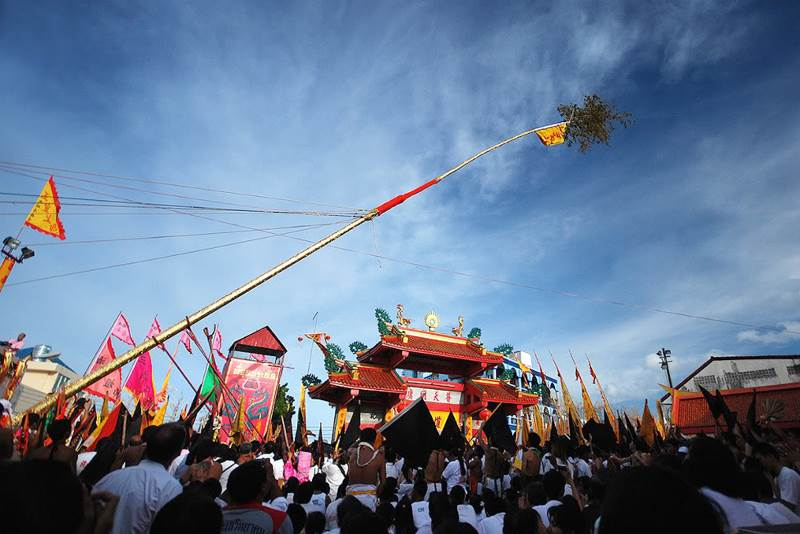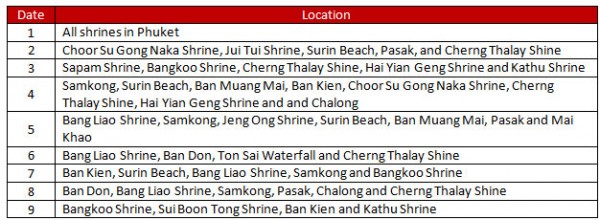Phuket hosts veggie fest
Phuket will host its annual Vegetarian Festival, 1 to 9 October, which attempts to give a traditional Chinese religious event a modern message for us to eat right.
The nine-day festival has its roots in community associations formed by early Chinese settlers, who migrated to Phuket from neighbouring Malaysia, Singapore, China, Taiwan and Hong Kong during the last century.
The Vegetarian Festival, called Prapheni Kin Jay or Prapheni Kin Phak in Thai (The Festival for Eating Vegetables), is now one of the major annual events on the Phuket calendar. It is also celebrated in all major towns in Thailand where Chinese migrants settled.
inside no 5Held in either September, or October, depending on the lunar calendar, the festival celebrates the Chinese belief that abstinence from meat, sex, alcohol, and other worldly activities, during the ninth lunar month of the Chinese calendar will help people to attain good health and a tranquil peace of mind for the rest of the year.
Though the origins of the festival remain unclear, it is believed that the festival was started in Phuket after an itinerant Chinese opera troupe fell ill with malaria, while performing on the island. The troupe then kept to a strict vegetarian diet and performed various rituals to two of their emperor gods.
They recovered quickly and this greatly impressed the local population, who embraced the ceremonies that are now the core elements of the festival today.
Thousands of people converge on the island every year to enjoy the festivities. The most talked about feature is the sight of devotees piercing their flesh with sharp objects in acts of self-mortification usually under a self-induced trance.
The local ethnic Chinese community, estimated at around a third of Phuket’s population, believes that these sacred rituals will chase away evil from the community, while bestowing good luck and fortune.
The festivities always include clusters of stalls serving vegetarian food cooked Chinese style. It is quite common for Thai families, whatever their ethnic links, to adhere to a vegetarian diet for the duration of this Chinese religious festival, ordering vegetarian dishes from shops and street-side stalls decorated in distinctive yellow and red bunting.
The main temple for the event on Phuket island is the Jui Tui Shrine, located near the fresh market in Phuket Town, although it is now hosted in areas around six Chinese temples on the island.
Visitors who want to get the most out of this event should visit the five oldest shrines in Phuket: Put Jaw, Jui Tui, Bang Neow, Cherng Talay, and Kathu Shrine.
Tourism Authority of Thailand’s office in Phuket has issued a detailed schedule of the festivities and processions in English, Thai and Chinese, available free at all participating shrines and at the TAT’s Phuket office located next to Queen Sirikit Park on Thalang Road in Phuket Town.
Travellers to Bangkok can join the vegetarian festival along Yaowarat Road, popularly known as Bangkok’s Chinatown. It attracts fans both vegetarians and non-vegetarians alike. Restaurants and street stalls across the city put up yellow flags to announce their participation in the festival. Some still serve non-vegetarian dishes, but the trend is to go pure vegetarian for the entire duration of the festival.
Many non-religious participants opt to go pure vegetarian for health reasons, mainly as a form of detoxification or a change from their standard meat diet.
Once the festival is over the street side vendors and restaurants revert to serving dishes that require the slaughter of animals. Outside of the festival dates, vegetarian food is not easy to find in Thailand’s food courts and streets, an indication that whatever this festival preaches it is not taken seriously for the rest of the year.






